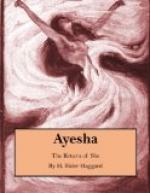Blackness, utter blackness; turmoil, doom, dismay! Beneath me the labouring horse; at my side the steady crest of light which sat on Ayesha’s brow, and through the tumult a clear, exultant voice that sang—“I promised thee wild weather! Now, Holly, dost thou believe that I can loose the prisoned Powers of the world?”
Lo! all was past and gone, and above us shone the quiet evening sky, and before us lay the empty bridge, and beyond it the flaming city of Kaloon. But the armies of Atene, where were they? Go, ask of those great cairns that hide their bones. Go, ask it of her widowed land.
Yet of our wild company of horsemen not one was lost. After us they galloped trembling, white-lipped, like men who face to face had fought and conquered Death, but triumphant—ah, triumphant!
On the high head of the bridge Ayesha wheeled her horse, and so for one proud moment stood to welcome them. At the sight of her glorious, star-crowned countenance, which now her Tribes beheld for the first time and the last, there went up such a shout as men have seldom heard.
“The Goddess!” that shout thundered. “Worship the Goddess!”
Then she turned her horse’s head again, and they followed on through the long straight street of the burning city, up to the palace on its crest.
As the sun set we sped beneath its gateway. Silence in the courtyard, silence everywhere, save for the distant roar of fire and the scared howlings of the death-hounds in their kennel.
Ayesha sprang from her horse, and waving back all save Oros and myself, swept through the open doors into the halls beyond.
They were empty, every one—all were fled or dead. Yet she never paused or doubted, but so swiftly that we scarce could follow her, flitted up the wide stone stair that led to the topmost tower. Up, still up, until we reached the chamber where had dwelt Simbri the Shaman, that same chamber whence he was wont to watch his stars, in which Atene had threatened us with death.
Its door was shut and barred; still, at Ayesha’s coming, yes, before the mere breath of her presence, the iron bolts snapped like twigs, the locks flew back, and inward burst that massive portal.
Now we were within the lamp-lit chamber, and this is what we saw. Seated in a chair, pale-faced, bound, yet proud and defiant-looking, was Leo. Over him, a dagger in his withered hand—yes, about to strike, in the very act—stood the old Shaman, and on the floor hard by, gazing upward with wide-set eyes, dead and still majestic in her death, lay Atene, Khania of Kaloon.
Ayesha waved her arm and the knife fell from Simbri’s hand, clattering on the marble, while in an instant he who had held it was smitten to stillness and became like a man turned to stone.
She stooped, lifted the dagger, and with a swift stroke severed Leo’s bonds; then, as though overcome at last, sank on to a bench in silence. Leo rose, looking about him bewildered, and said in the strained voice of one who is weak with much suffering—“But just in time, Ayesha. Another second, and that murderous dog”—and he pointed to the Shaman—“well, it was in time. But how went the battle, and how earnest thou here through that awful hurricane? And, oh, Horace, thank heaven they did not kill you after all!”




